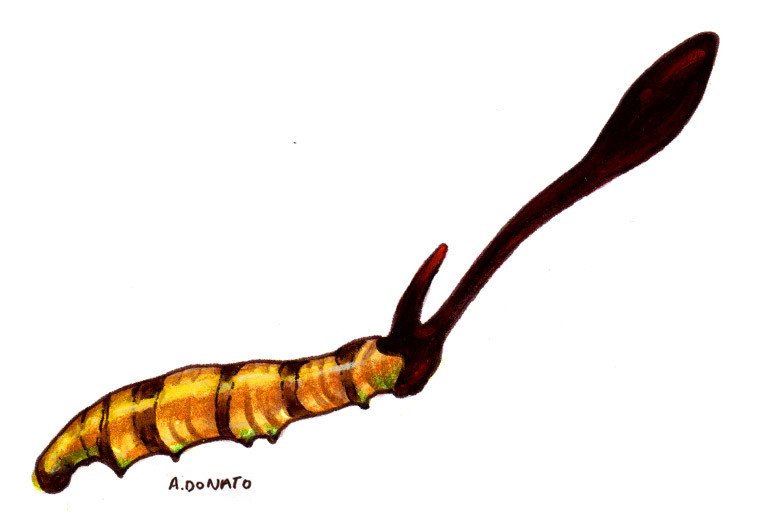
Common Names
- Vegetable caterpillar
- Chinese caterpillar fungus
- Dong chong xia cao
- Semitake
- Hsia ts'ao tung ch'ung
- Yarsha gumba
For Patients & Caregivers
Tell your healthcare providers about any dietary supplements you’re taking, such as herbs, vitamins, minerals, and natural or home remedies. This will help them manage your care and keep you safe.
What is it?
Cordyceps is a fungus that grows on the caterpillar of a moth. It is used in traditional Chinese medicine. Cordyceps supplements come as capsules, powders, and liquid extracts.
What are the potential uses and benefits?
Cordyceps is used to:
- Boost your immune system
- Help your kidneys work better
- Boost strength and stamina
Cordyceps has other uses, but doctors haven’t studied them to see if they work.
Talk with your healthcare providers before taking cordyceps supplements. Herbal supplements are stronger than the herbs you’d use in cooking. They can also interact with some medications and affect how they work. For more information, read the “What else do I need to know?” section below.
What are the side effects?
No major side effects have been reported.
What else do I need to know?
- Talk with your healthcare provider if you’re taking insulin or another medication that lowers your blood sugar. Cordyceps can also lower blood sugar levels and may cause harm.
- Talk with your healthcare provider if you’re taking a blood thinner, such as warfarin (Coumadin® and Jantoven®). Cordyceps may increase your risk of bleeding.
For Healthcare Professionals
Scientific Name
Clinical Summary
Found in cold climates, cordyceps refers to the complex of a parasitic fungus that grows on the larvae of the moth Hepialus armoricanus Oberthuer. It is used in traditional Chinese medicine for a wide range of conditions including fatigue, sexual dysfunction, coughs, and as an adaptogen or immune stimulant. Preclinical studies show antitumor (10) (11) (14), radioprotective (12), antiplatelet (19) and antidiabetic effects (15) (16). In addition, cordyceps enhances recovery of mice with taxol-induced leukopenia (13) and increases the cytotoxicity of cisplatin in non-small cell lung cancer cells (17).
In clinical studies, cordyceps products improved renal function and reduced nephropathy in renal transplant patients (18) (21) (23) and diabetes patients with renal insufficiency undergoing coronary angiography (25). However, several analyses found that evidence for its utility as adjuvant treatment in renal transplant recipients and hemodialysis patients is insufficient (26) (27). Studies on exercise performance in healthy subjects yielded mixed results (22) (24).
Cordyceps may increase the adverse effects of antidiabetic or anticoagulant/antiplatelet drugs. Animal studies showed proliferation of progenitor red blood cells with cordyceps (8). Therefore, it should not be used by those with myelogenous type cancers. Cordyceps also stimulated testosterone production in mice (9). Whether it exerts similar effects in humans is not known.
Purported Uses and Benefits
- Immunostimulation
- Kidney disease
- Strength and stamina
Mechanism of Action
Laboratory studies demonstrate that cordyceps stimulates T helper cells, prolongs lymphocyte survival, enhances TNF-alpha and IL1 production, and increases activity of NK cells (3). Enhanced proliferation of erythroid progenitor cells in murine bone marrow (8) and increased progesterone production in animal cells (5) have also been shown. Other experiments suggest cordyceps may inhibit tumor celIs by downregulating MHC class II antigen expression (7). Anecdotal data suggest reduction of cyclosporin and aminoglycoside-induced renal toxicity, although the mechanism of action is not known (4). Cordycepin, an active constituent in cordyceps, inhibits collagen-induced platelet aggregation by lowering calcium ion and thromboxane A2 activities (19).
Adverse Reactions
Case Report
Excessive bleeding: Post tooth extraction and associated with cordyceps being used daily as a tonic (28).
Herb-Drug Interactions
Hypoglycemics / Insulin: Laboratory studies suggest cordyceps may have additive hypoglycemic effects (16) (17). Clinical relevance has yet to be determined.
Anticoagulants / Antiplatelets: Laboratory studies suggest cordyceps inhibits platelet aggregation and may increase the effects of these drugs (19). There is also a case report of excessive bleeding from a dental procedure linked to cordyceps (28).